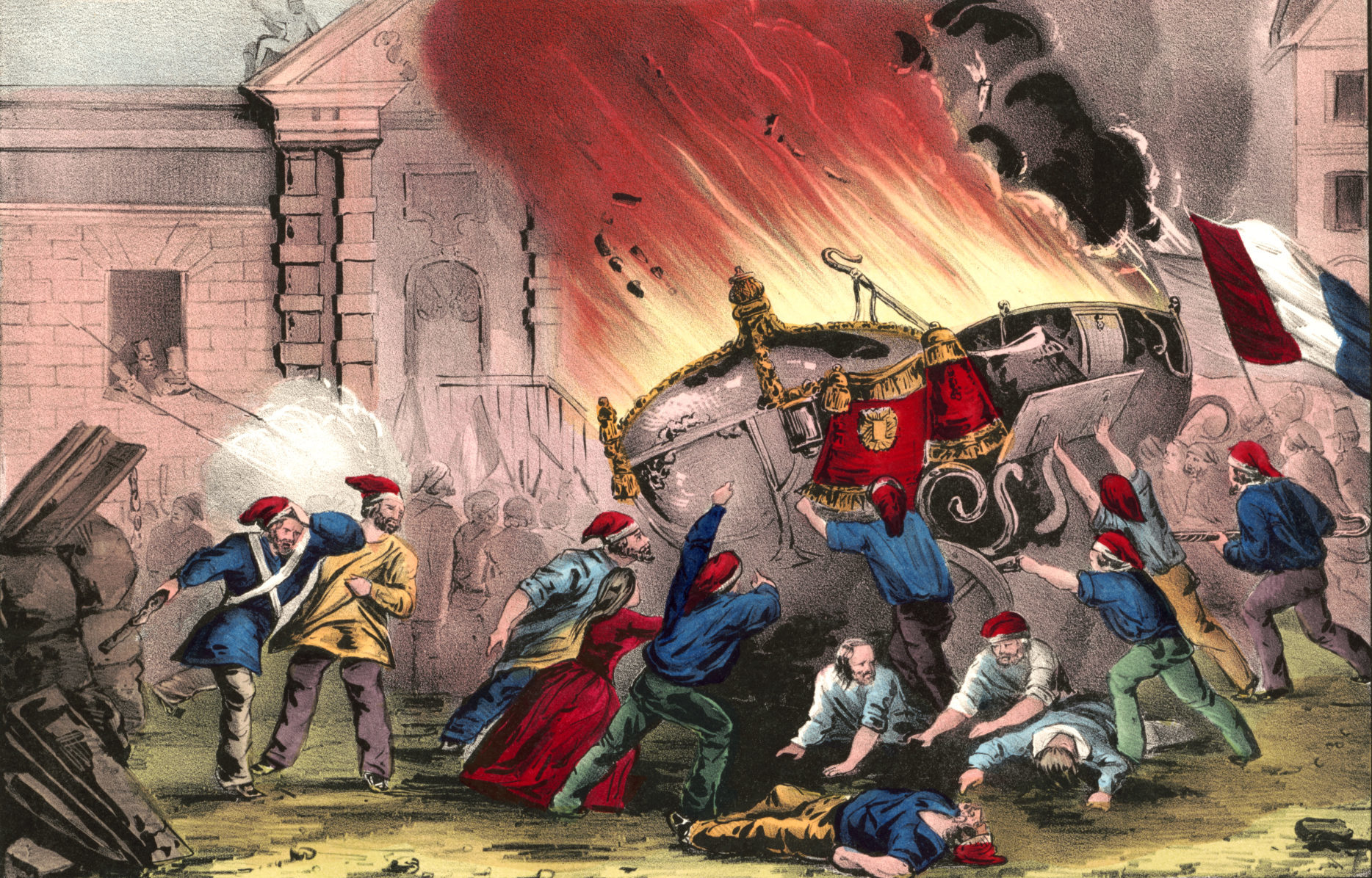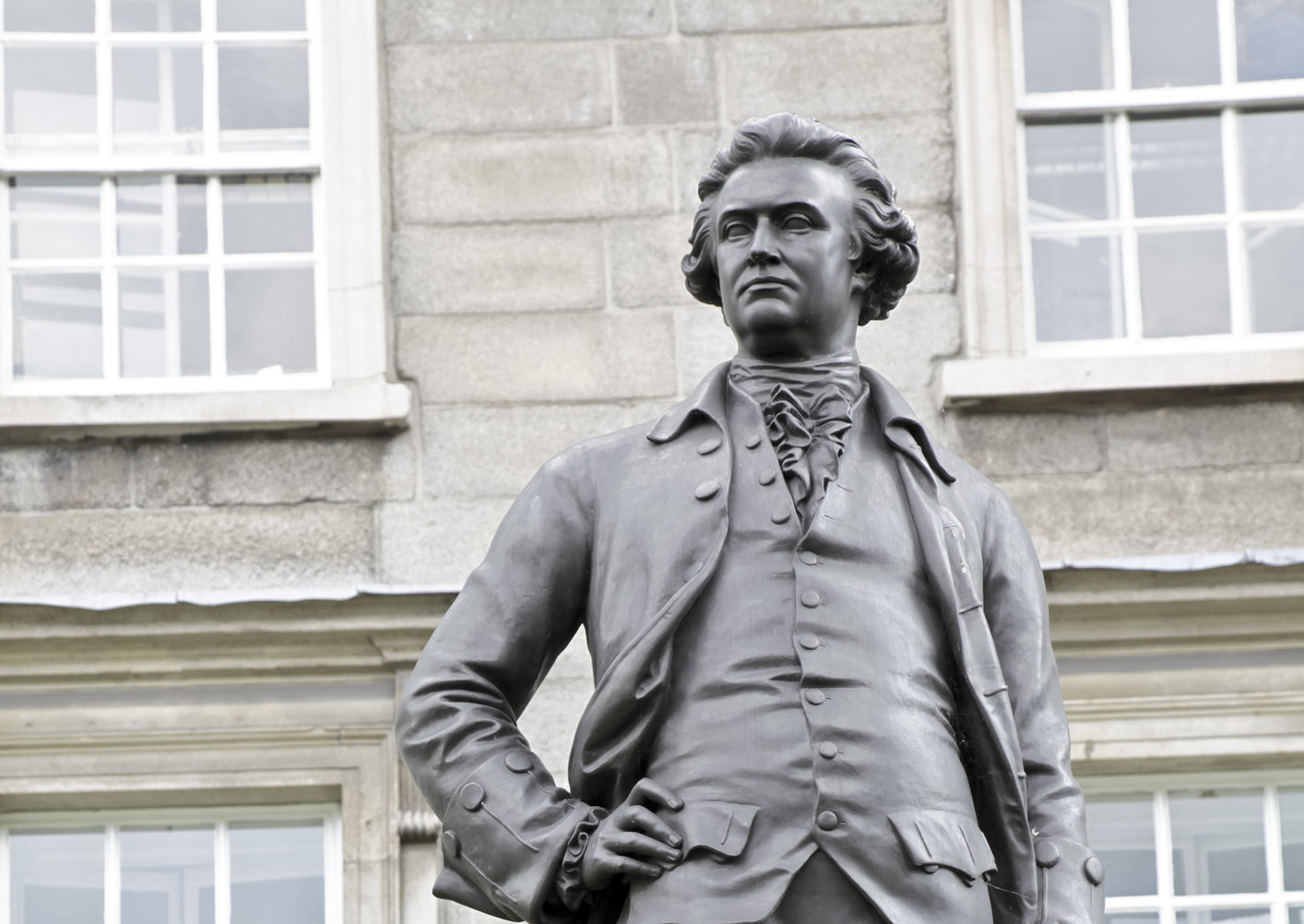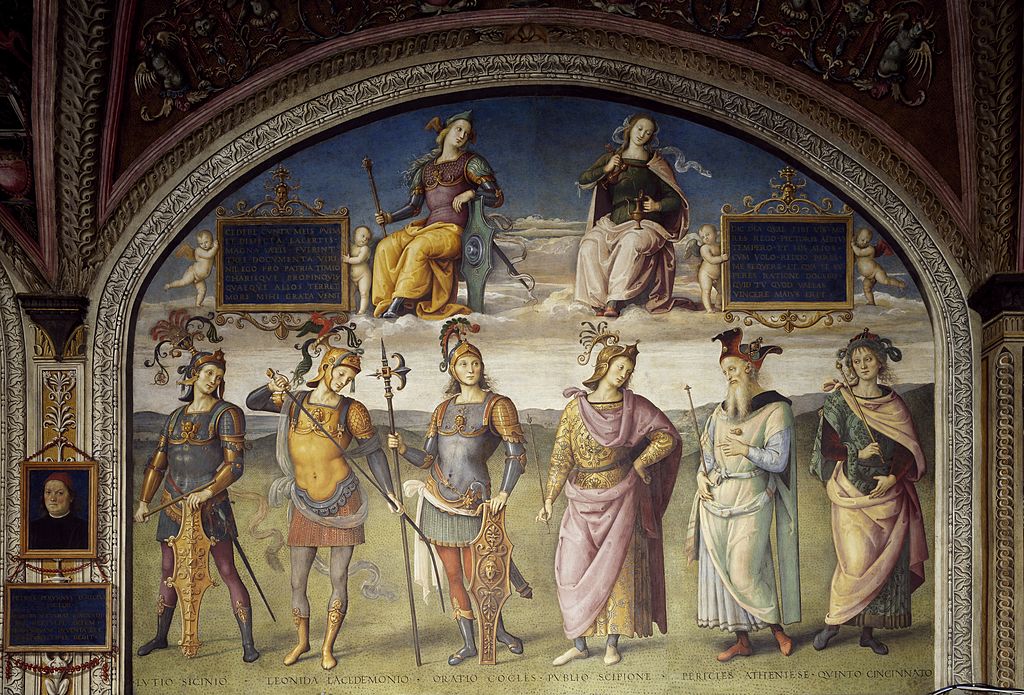Burke, Tocqueville, and Lincoln on the right ordering of society.
The Courage to See

The brave moderation and manly prudence of Edmund Burke.
Editors’ note: This excerpt is adapted from The Statesman as Thinker: Portraits of Greatness, Courage, and Moderation, by Daniel J. Mahoney, available now from Encounter Books.
Burke’s Profound Consistency of Purpose
I will not be the first to draw upon and endorse Winston Churchill’s defense of Edmund Burke against the charge of inconsistency. As Churchill wrote in his magisterial 1932 essay “Consistency in Politics,” “mean and petty” spirits cannot appreciate how Burke fought against “a domineering Monarch and a corrupt Court and Parliamentary system” at home as the intellectual leader of the Whig Party and yet sympathized with the just demands of the American colonists, fought imperial abuse in India, and opposed the oppression of Irish (with whom he had deep ancestral roots[1]) while, at the same time, fighting with all his eloquence and might a “brutal mob and wicked sect” that was destroying France and unleashing war in the whole of Europe. Churchill adds, with an eloquence that matches Burke’s own, that “no one can read the Burke of Liberty and the Burke of Authority without feeling that here was the same man pursuing the same ends, seeking the same ends of society and Government, and defending them from assaults, now from one extreme, now from the other.” Churchill, a liberal conservative in the Burkean tradition, unsurprisingly gets to the heart of the matter. He saw in Burke a mix of principle and prudence at the highest and most honorable level. About this he was surely right.
The True Rights of Man
Burke is the greatest of modern thinkers who was at once a liberal and a conservative and even the founder, as many people have deemed him, of a distinctively conservative current within liberal modernity. His cause was liberty in the most capacious yet ordered sense: “a manly, moral, regulated liberty” (RRF[2], 7), as he so eloquently put it in the opening pages of Reflections on the Revolution in France in 1790. Without in any way jettisoning eternal verities— the “Permanent Things,” as T. S. Eliot called them—the Anglo-Irish statesman reaffirmed the classical principle of prudence where “circumstances…give in reality to every political principle its distinguishing colour and discriminating effect” (RRF, 7). In revolutionary France he saw less the restoration of “light and liberty” than a profound lawlessness in the guise of a fevered proclamation of the “pretended rights” (RRF, 7) of man.
In Burke’s considered judgment, these rights were severed from “political reason” rightly understood. They were used to excuse the fulfilling of moral and civic obligations that are, always and everywhere, at the core of ordered or civilized liberty. Burke insisted that he was in no way opposed to the “real rights of men” (RRF, 50). Those rights draw on a concrete tradition of liberty rooted in law and gratitude toward the moral inheritance passed on by our forebears. In contrast, the “pretended rights” of the revolutionaries would “totally destroy” that inheritance while severing freedom from the primordial contract, the true social contract, that connects the living to the dead and to those yet to be born. In a justly famous passage in Reflections, Burke defines the “great primaeval contract of eternal society” as “a partnership in all science; a partnership in all art; a partnership in every virtue; and in all perfection” (RRF, 82). It is by no means limited to the concerns of the flesh and commodious self-preservation. It is a genuinely social contract informed by deep indebtedness to those who came before us and of self-conscious obligation to those who will follow. Modern social contract theories, on the other hand— those proffered by Hobbes, Locke, and Rousseau with some variations—“dissolve” the body politic “into an unsocial, uncivil, unconnected chaos of elementary particles” (RRF, 19). Their principle is the principle of dissolution.
Conservative Reformation versus Radical “Innovation”
Burke knew, in his memorable formulation, that “a state without the means of some change is without the means of its conservation” (RRF, 19 for all quotations in this paragraph). He saw in age-old English liberty an admirable capacity to unite “conservation and correction,” even in extraordinary circumstances such as the Restoration of the monarchy after a tumultuous period of Civil War and Cromwellian despotism and the Glorious Revolution of 1688 when Britain momentarily found herself without a king. The ancient constitution of England was “regenerated,” or so Burke believed, and necessary reforms were introduced precisely as reforms and not as radical innovations. The body politic was thus never “disbanded,” never subjected to self-conscious and potentially nihilistic revolutionary assault. Reformation was its salutary principle.
The literary critic and man of letters George Watson perfectly captured Burke’s thinking on these matters in a 1984 essay called “Burke’s Conservative Revolution” that originally appeared in Critical Quarterly. As Watson points out, reform for Burke, or even conservative revolution, “has nothing to do with total change and a new start, since it arises out of a respect for the system that it seeks to improve.” Burke put the matter most directly in his 1796 Letter to a Noble Lord, where he insisted that “to innovate is not to reform.” That is what the fellow-traveling nobles whom Burke severely reprimands in his rhetorical tour de force cannot begin to recognize. Like literary intellectuals before and after them, they flirted with radical revolution “in the complete style of the Jacobins” and later the Bolsheviks. As Watson puts it, the true reformer has everything to fear from nihilistic revolution even as the “violent revolutionary has everything to fear from reforms intelligently conducted and seen to work.”
Watson aptly refers to “Burke’s reforming horror of complete revolution” and sees the same anti-totalitarian and anti-revolutionary impulses in a twentieth-century figure such as George Orwell. The same could be said of the Russian writer Aleksandr Solzhenitsyn, who admired the great reformer Pyotr Stolypin but despised the murderous destructiveness of Lenin and his Bolshevik minions. Reform, an essentially conserving act for Burke, presupposes the continuity of civilization. Radical innovation, in contrast, prefers destruction to the patient and arduous work of conservative reformation. Burke’s great writings from the 1790s, beginning with Reflections, aim to inculcate precisely such an understanding and distinction. This was a central aim of his mission as statesman and political philosopher. Burke eschews both reaction and revolution for the noble path of conservative reformation.
Prudence, Not Cultural or Moral Relativism
The abstract theorizing of the French revolutionaries (and its intellectual boosters) that Burke excoriated should not be confused with any contempt for truth or enduring moral principles on his part. Burke is the furthest thing from a relativist or a historicist who denies unchanging truths. In the impeachment trial of Warren Hastings, the governor general of the East India Company, for governing India in the spirit of a rapacious conquering army, Burke famously criticized “geographical morality.” He insisted that “the laws of morality are the same everywhere; and actions that are stamped with the character of peculation, extortion, oppression, and barbarity in England, are so in Asia, and the world over.” The Burke scholar Peter Stanlis has persuasively argued that Burke remained in some sense an adherent (although I would add a qualified one) of the natural law tradition. A moral and cultural relativist he was not.
“The science of constructing a commonwealth, or renovating it, or reforming it, is, like every other experimental science, not to be taught à priori” (RRF, 51). It nonetheless needs to be guided by wisdom rooted in historical experience, carefully crafted prudential judgment, and the moral precepts shared by all decent and civilized peoples. Political reason, Burke tells us, “is a computing principle; adding, subtracting, multiplying, and dividing, morally and not metaphysically, or mathematically, true moral denominations” (RRF, 52). If political reason so understood eschews the spirit of abstraction, of reckless theorizing, if it does not confuse metaphysical certitude with the necessarily “circumstantial” character of political judgment, it nonetheless deals with “true moral denominations.” Unless directed by sound principles or even by “prejudice,” understood by Burke as deference to the practical wisdom inherent in long-established traditions, circumstances in and of themselves cannot determine the decisions of a statesman. Prudence needs principle as much as principle needs prudence. Guided by the classics such as Aristotle and Cicero, Burke never confuses prudence with mere calculation or pragmatism or with a rejection of moral limits and constraints. In this regard, he is with the ancients and the Christians and not the modern Machiavellian tradition.
Political reason is thus a practical or non-metaphysical manifestation of the human capacity for reason and has nothing to do with a rejection of reason per se. Tradition is indispensable to political reason precisely because it is a powerful vehicle for passing on the inherited or tried-and-true wisdom of the human race. It is in no way a “mystical” or irrational substitute for theoretical or practical reason. Rather, it is the form reason takes in the judgments and decisions appropriate to the changing circumstances that constitute public life and the great tasks of public-spirited statesmanship. Burke is a critic of an all-encompassing political rationalism but never of political reason within its legitimate sphere.
Prudence as Tough-Minded Moderation
As Greg Weiner puts it in his fine, recent book Old Whigs: Burke, Lincoln, and the Politics of Prudence, the prudent statesman must learn to combine “principle and circumstance” and, I would add, moderation and courage in a judicious and prudent way. Those noble virtues have an essential place in the exercise of judgment and action informed by prudence and are virtues in and of themselves. Weiner expertly shows that, for Burke, prudence is inseparably connected to “politic caution, a guarded circumspection” and a “moral rather than complexional timidity.” Those qualities, Burke wrote, were always “among the ruling principles of our forefathers in their most decided conduct.” Weiner quite rightly remarks that Burke “was perhaps the first commentator fully to theorize the case for caution as a sort of default position rooted in the moral virtue of humility.” The statesman is first and foremost the caretaker of a noble (if imperfect) inheritance that must be safeguarded and even cherished. Precipitous and presumptuous efforts to depart from the tried and true woefully exaggerate the human capacity to begin things de novo, from scratch, without the guidance of the wisdom of the past or the experience of our forebears. Burke’s endorsement of “politic caution” is thus both practical and epistemological in character since the revolutionary “innovator” has little or no appreciation of what he does not know. From this fatal mixture of ignorance and hubris only reckless destruction can follow.
But once the ideological temptation is afoot in the human world, moderation must be accompanied by courage and no inconsiderable amount of spiritedness if civilization is to survive. When many in the English political class mistook post-Robespierre France with an ordinary European power, pursuing its national interest like any other great people or nation, Burke took aim at a “misguided prudence” that confused cowardice (or confusion) with humility. Burke saw “imprudent timidity” all around him rather than the true “wisdom of a nation.” Confronted by an aggressive ideological despotism that aimed to upend all governments not based on its revolutionary principles, Burke attacked the “unworthy hesitation” that flowed from the lack of “the courage to see” (to use a phrase of Solzhenitsyn’s addressing a similar tendency among twentieth-century politicians and intellectuals who refused to acknowledge expansionist Communism for what it really was). Weiner draws our attention to a distinction Burke introduces in the Letters on a Regicide Peace between “courageous wisdom” and a “false, reptile prudence” that arises not out of salutary “caution” but out of “fear” and misjudgment perhaps rooted in the failure to cultivate “the courage to see.” Yet whether as an advocate of “politic caution” or as a critic of “hesitating prudence” and “weakness of will,” Burke continues to exercise all the humanizing arts of prudence. In addition, his appeal to courage is never severed from an underlying moderation committed to the preservation of a civilization that bows in gratitude before the inherited wisdom of the past and that upholds the permanent necessity of “sacred limits and restraints.” Few statesmen can match the capaciousness of Burke’s soul, one that ties together courage and moderation and nobility of spirit with a humble deference before both God and the great inheritance that is civilization itself. Burke exudes nobility in his every thought and deed.
[1] The always insightful and provocative Conor Cruise O’Brien has made this the key to understanding Burke tout court. One need not go nearly so far to appreciate that Burke remained a son of Ireland in important respects, a product of the influential Nagel family of County Cork on his mother’s side (a distinguished part of Ireland’s Catholic aristocracy) and a man who was faithfully married to his Catholic wife, Jane, for many decades. In his Introduction to his significant anthology of Burke’s writings, Reflections on the Revolution in France and Other Writings (New York, London, Toronto: Everyman’s Library), Jesse Norman describes the “private” Burke at the age of fifty in 1780: a “bespectacled Irishman” with red hair (when his wig was off), a Christian and “Christian latitudinarian” (truly respectful of Catholics and Protestant dissenters), an eminently “clubbable” figure who spoke to his wife with the “utmost tenderness”( Norman, pp. xii–xiii). It is an affecting portrait. Even as Burke fought Jacobinism with all his might, he worked to modify or eliminate Catholic disabilities in Ireland and to give aggrieved Irish Catholics some participation in the franchise. Burke saw their “universal exclusion” from the franchise, and thus from genuine political representation, as “a serious evil.” See the “Letter to Sir Hercules Langrishe” in Norman, op. cit., p. 603.
[2] I have consulted Frank Turner’s edition of Burke’s Reflections on the Revolution in France, published in the Rethinking the Western Tradition series by Yale University Press in 2003. All quotations from this edition of Reflections on the Revolution in France will be cited parenthetically in the body of the text followed by the appropriate page numbers.
The American Mind presents a range of perspectives. Views are writers’ own and do not necessarily represent those of The Claremont Institute.
The American Mind is a publication of the Claremont Institute, a non-profit 501(c)(3) organization, dedicated to restoring the principles of the American Founding to their rightful, preeminent authority in our national life. Interested in supporting our work? Gifts to the Claremont Institute are tax-deductible.
There is wisdom to be found in obligation.
Prudence looks different on each side of the Atlantic.
A prudential reading of a prudent statesman.
Edmund Burke’s prudential wisdom has much to teach American conservatives.





